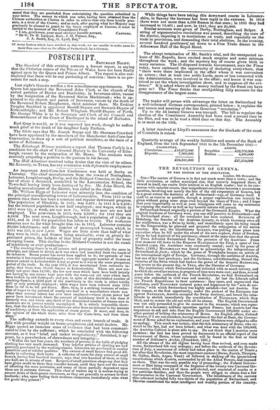An important Anti-Corn-law Conference was held at Derby on Thursday.
The chief manufacturers from the towns of Nottingham, Leicester, Loughborough, Derby, and the Midland Counties, to the num- ber of about a thousand, assembled in the Lancasterian School, the Town-hall having lately been destroyed by fire. Mr. John Heard, the leading manufacturer of the district, was called to the chair.
Mr. William Biggs of Leicester went minutely into the condition of the principal manufacturing towns of Leicestershire. From 1815 to the present time there has been a constant and regular downward progress. The population of Hinckley, in 1831, was 6,491 ; in 1841 it 113 6,459 ; but the reduced population is not half employed; and wages, which in 1815 were 12s. a week, are not now 7s., while the men are not half employed. The poor-rates, in 1815, were 2,929/. ; for 1841 they are 4,2401. The next town, Loughborough, had a population of 11,000 in 1831, and in 1841 the population has fallen to 10,000. The workman receives now 8s. for what brought him 14s. in 1815. Leicester contains 50,000 inhabitants ; and the number of unoccupied houses, which in 1831 was 550, is now 1,400. Wages are little more than half of what they were in 1815 ; and frames being unsaleable, even at greatly de- preciated prices, the holders of that kind of property suffer the most sweeping losses. This decline in the Midland Counties is not the result of machinery or over-production- " The stocking-frame is to all intents and purposes essentially the same in principle, and almost in detail, as it was when first launched from the hands of its inventor. Steam power has never been applied to it; for upwards of two centuries it has remained unchanged ; even the aggregate number of frames at present extant in Leicestershire is not so great as it was in the more prosperous period of the trade. In the year 1815, it was ascertained from extensive in- quiry, that there were 16,000 frames in Leicestershire. There are now cer- tainly not more than 14,000; the few new ones which have been built latterly not having; by any means kept pace with the worn-nut old ones which have been broken up and destroyed; and yet, in spite of this diminished number of stocking-frames, a third part of the machinery in the trade is either totally still or only partially employed ; while wages have been reduced since 1815 from 7s. 6d. to 4s. 6d. per dozen. Here, then, is a striking instance of reduc- tion of wages to the amount of nearly one-half in a manufacture where non other than manual labour has ever been employed—where steam power has never been introduced, where the amount of machinery itself is less than it formerly was, and where one-third of the diminished number of frames now in existence are at present totally unemployed. It is utterly impossible, there- fore, that the distress in Leicestershire can arise from an increase in the amount of machinery, or from the application of steam power. It must, and does, in the opinion of the whole trade, arise from the Corn-laws, and from them alone."
The suffering extends to every class and every branch of trade. It falls with peculiar weight on house-proprietors and retail dealers. Mr. Biggs quoted an immense mass of evidence that had been communi- cated to him by the sufferers ; which he concluded with the following account, as it was "brief, and rather recapitulatory," furnished, it ap- pears, by a pawnbroker, of shrewdness and integrity-
" Within the last four years, the numbers of persons in the habit of pledging clothing has very much increased. Very inferior articles of clothing are now generally purchased by the working-classes. Groceries are purchased in smaller quantities and of inferior qualities. The owners of small houses find great dif- ficulty in collecting their rents. A collector of rents for sixty owners of small houses, having four hundred tenants, says that two hundred of them, or fully one-half, are in arrears of rent. Keepers of small provision-shops say that they have given credit to those they consider honest, until they have not the means of affording the same assistance, and many of those partially dependent upon them are in extreme distress. This class of traders say it is useless trying to recover debts of their poorer customers, as they are generally in arrears to their landlords; who, upon finding their creditors clamorous, immediately seize what few goods they possess I" While things have been taking this downward course in Leicester- shire, in Saxony the increase has been rapid in the extreme. In 181fr there were not more than 4,500 frames in that state ; in 1835 they had increased to 13,481 ; and now, in 1841, they are 25,000.
Similar accounts were given of Derby, Nottingham, and Belper. A. string of argumentative resolutions was passed, describing the state of the district, imputing it to restrictions on trade, and especially on the trade in provisions, and demanding their total abolition. In the evening, several hundred gentlemen.' sat down to a Free Trade dinner in the Athenaeum Hall of the Royal Hotel.


























 Previous page
Previous page